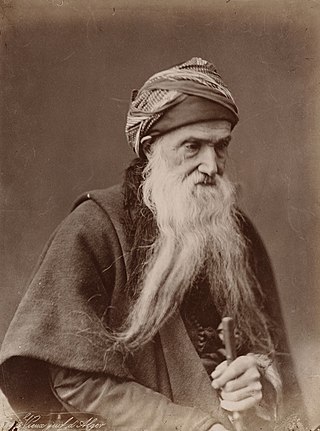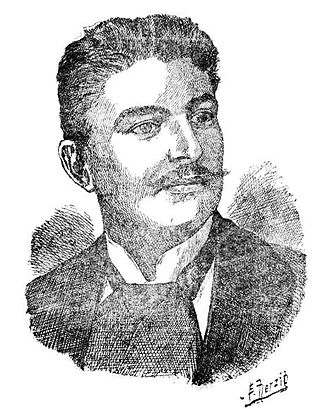
The Dreyfus affair was a political scandal that divided the Third French Republic from 1894 until its resolution in 1906. The scandal began in December 1894 when Captain Alfred Dreyfus, a 35-year-old Alsatian French artillery officer of Jewish descent, was convicted of treason for communicating French military secrets to the German Embassy in Paris. He was sentenced to life imprisonment and sent overseas to the penal colony on Devil's Island in French Guiana, where he spent the following five years imprisoned in very harsh conditions.

Alfred Dreyfus was a French artillery officer of Jewish ancestry from Alsace whose trial and conviction in 1894 on charges of treason became one of the most polarizing political dramas in modern French history. The incident has gone down in history as the Dreyfus affair, the reverberations from which were felt throughout Europe. It ultimately ended with Dreyfus' complete exoneration.
In the 20th century, approximately 900000 Jews migrated, fled, or were expelled from Muslim-majority countries throughout Africa and Asia. Primarily a consequence of the 1948 Arab–Israeli War, the mass movement mainly transpired from 1948 to the early 1970s, with one final exodus of Iranian Jews occurring shortly after the Islamic Revolution in 1979–1980. An estimated 650000 (72%) of these Jews resettled in Israel.

Édouard Adolphe Drumont was a French antisemitic journalist, author and politician. He initiated the Antisemitic League of France in 1889, and was the founder and editor of the newspaper La Libre Parole. After spending years of research, he synthesised three major types of antisemitism. The first type was traditional Catholic attitudes toward the alien "Christ killers" augmented by vehement antipathy toward the French Revolution. The second type was hostility toward capitalism. The third type was so-called scientific racism, based on the argument that races have fixed characteristics, and asserting that Jews have negative characteristics. His work played a key role in catalyzing the Dreyfus Affair.

Maghrebi Jews or North African Jews are ethnic Jews who had traditionally lived in the Maghreb region of North Africa under Arab rule during the Middle Ages. Established Jewish communities had existed in North Africa long before the arrival of Sephardi Jews, expelled from Portugal and Spain. The term Musta'arabi was also used by medieval Jewish authors to refer to Jews who had traditionally lived in the Maghreb. Due to proximity, the term 'Maghrebi Jews' sometimes refers to Egyptian Jews as well, even though there are important cultural differences between the history of Egyptian and Maghrebi Jews. These Jews originating from North Africa constitute the second largest Jewish diaspora group.

The history of the Jews in France deals with Jews and Jewish communities in France since at least the Early Middle Ages. France was a centre of Jewish learning in the Middle Ages, but persecution increased over time, including multiple expulsions and returns. During the French Revolution in the late 18th century, on the other hand, France was the first European country to emancipate its Jewish population. Antisemitism still occurred in cycles and reached a high in the 1890s, as shown during the Dreyfus affair, and in the 1940s, under Nazi occupation and the Vichy regime.

The history of Jews in Algeria goes back to Antiquity, although it is not possible to trace with any certainty the time and circumstances of the arrival of the first Jews in what is now Algeria. In any case, several waves of immigration helped to increase the population. There may have been Jews in Carthage and present-day Algeria before the Roman conquest, but the development of Jewish communities is linked to the Roman presence. Jewish revolts in Israel and Cyrenaica in the 1st and 2nd centuries certainly led to the arrival of Jewish immigrants from these regions. The vast majority of scholarly sources reject the notion that there were any large-scale conversions of Berbers to Judaism.

The Mozabite people or Banu Mzab are a Berber ethnic group inhabiting the M'zab natural region in the northern Sahara in Algeria, numbering about 150,000 to 300,000 people. They speak primarily the Mozabite language, one of the Zenati languages in the Berber branch of the Afroasiatic family. Mozabites are primarily Ibadi Muslims, but there was a small population of Jews as well.

Bernard Lazare was a French literary critic, political journalist, polemicist, and anarchist. He is known as the first Dreyfusard.
The far-right tradition in France finds its origins in the Third Republic with Boulangism and the Dreyfus affair. In the 1880s, General Georges Boulanger, called "General Revenge", championed demands for military revenge against Imperial Germany as retribution for the defeat and fall of the Second French Empire during the Franco-Prussian War (1870–71). This stance, known as revanchism, began to exert a strong influence on French nationalism. Soon thereafter, the Dreyfus affair provided one of the political division lines of France. French nationalism, which had been largely associated with left-wing and Republican ideologies before the Dreyfus affair, turned after that into a main trait of the right-wing and, moreover, of the far right. A new right emerged, and nationalism was reappropriated by the far-right who turned it into a form of ethnic nationalism, blended with anti-Semitism, xenophobia, anti-Protestantism and anti-Masonry. The Action française, first founded as a journal and later a political organization, was the matrix of a new type of counter-revolutionary right-wing, which continues to exist today. During the interwar period, the Action française (AF) and its youth militia, the Camelots du Roi, were very active. Far right leagues organized riots.
Legislative elections were held in France on 8 and 22 May 1898. The government of Jules Méline, who had been prime minister since April 1896, had relied on the support of Conservatives, contrary to the convention of republican concentration, according to which no government should rely on the support of monarchists and Bonapartists in the Chamber of Deputies if it could not rely on a republican majority.

The history of the Jews in Alsace is one of the oldest in Europe. It was first attested to in 1165 by Benjamin of Tudela, who wrote about a "large number of learned men" in "Astransbourg"; and it is assumed that it dates back to around the year 1000. Although Jewish life in Alsace was often disrupted by outbreaks of pogroms, at least during the Middle Ages, and reined in by harsh restrictions on business and movement, it has had a continuous existence ever since it was first recorded. At its peak, in 1870, the Jewish community of Alsace numbered 35,000 people.

Anti-Jewish riots occurred on June 7–8, 1948, in the towns of Oujda and Jerada, in the French protectorate of Morocco in response to the 1948 Arab–Israeli War ensuing the declaration of the establishment of the State of Israel on May 14. The two towns—located near the border with Algeria—were departure points for Moroccan Jews seeking to migrate to Israel; at the time they were not permitted to do so from within Morocco. In the events, 47 Jews and one Frenchman were killed, many were injured, and property was damaged.

La Libre Parole or La Libre Parole illustrée was a French antisemitic political newspaper founded in 1892 by journalist and polemicist Édouard Drumont.

Max Régis was a French journalist and politician who promoted anti-semitism in French Algeria during the late 1890s. He was elected mayor of Algiers in 1898 but was soon dismissed from office. He campaigned unsuccessfully for election as a national deputy in 1901 as an antisemitic candidate. He lived the rest of his life in obscurity.

The Géo Gras Group was a French resistance movement that played a decisive role during Operation Torch, the British-American invasion of French North Africa during World War II.

The 1934 Constantine riots erupted in the Algerian city of Constantine against the local Jewish population, rooted in the different manner in which Jews and Muslims had been treated in Algeria by the French colonial government. It is uncertain what the exact cause of the riots was, though various accounts suggest that the riots were triggered by an altercation between a Jewish man and some Muslims at the Sidi Lakhdar Mosque in Constantine. Multiple sources report that 25 Jews and 3 Muslims died over the course of the three-day riot, and several Jewish establishments were pillaged. The events have also been described as a pogrom.
This timeline of antisemitism chronicles the acts of antisemitism, hostile actions or discrimination against Jews as a religious or ethnic group, in the 19th century. It includes events in the history of antisemitic thought, actions taken to combat or relieve the effects of antisemitism, and events that affected the prevalence of antisemitism in later years. The history of antisemitism can be traced from ancient times to the present day.

Antisemitism in France is the expression through words or actions of an ideology of hatred of Jews on French soil.

Colette Béatrice Aboulker-Muscat was a French teacher, writer, natural healer, and kabbalist whose focus was on the healing power of dream imagery. As a young woman, she took part in the Resistance movement in Vichy Algeria with her father Dr. Henri Samuel Aboulker and brother Jose Aboulker and, as a result, was awarded the Croix de Guerre in January 1948. She studied philosophy at the Sorbonne as well as psychology with French psychotherapist Robert Desoille, becoming interested in mental imagery and dream imagery, which would become her life's work. A practitioner of The Kabbalah of Light, in 1954 she moved to Jerusalem where she was honored with the Yakir Yerushalayim award in 1995, and authored five books about the healing power of mental and dream imagery.















